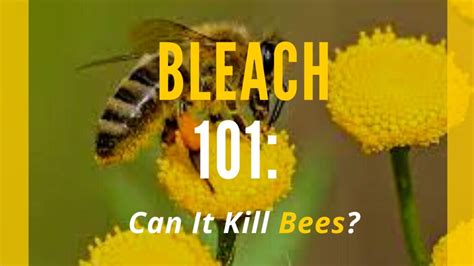How Fast Does Bleach Kill Bees
Ronan Farrow
Apr 04, 2025 · 2 min read

Table of Contents
How Fast Does Bleach Kill Bees? The Dangers of Bleach to Bees and the Environment
Bleach is a powerful cleaning agent, but its strength comes at a cost. While effective at sanitizing surfaces, bleach is highly toxic to bees and other beneficial insects. Understanding how quickly it acts and the broader environmental impact is crucial for responsible pest control and bee conservation.
The Speed of Bleach's Lethal Effect on Bees
There's no single definitive answer to "how fast does bleach kill bees?" because the speed depends on several factors:
- Concentration: A stronger bleach solution will kill bees faster than a diluted one.
- Exposure method: Direct contact is obviously faster than indirect exposure through contaminated pollen or water sources.
- Bee species and age: Different bee species might have varying sensitivities, and younger bees may be more vulnerable.
- Environmental conditions: Temperature and humidity can influence the toxicity and effectiveness of the bleach.
While a direct application of undiluted bleach can kill a bee almost instantly, a weaker solution or indirect exposure could take several hours or even days to prove fatal. The bee might experience immediate distress and die quickly from respiratory failure or organ damage. However, even small amounts of bleach residue can be harmful, affecting the bee's ability to navigate, forage, and ultimately survive.
Why is this information important?
Knowing that bleach's effects on bees are swift and potentially devastating emphasizes the importance of choosing bee-friendly alternatives for pest control and cleaning. The widespread use of bleach carelessly poses a significant threat to bee populations already facing numerous challenges.
The Wider Environmental Impact of Bleach
The harmful consequences of bleach extend beyond just bees. Runoff from bleach solutions can contaminate soil and water sources, harming other insects, plants, and aquatic life. The chemicals in bleach are persistent pollutants, lingering in the environment and causing long-term damage to ecosystems.
Sustainable Alternatives to Bleach
Numerous environmentally friendly and bee-safe cleaning solutions are available:
- Vinegar: Effective for cleaning and disinfecting, vinegar is a natural and non-toxic alternative.
- Baking soda: A mild abrasive cleaner, great for scrubbing and deodorizing.
- Soap and water: Often the simplest and most effective solution for many cleaning tasks.
- Essential oils (diluted): Certain essential oils have natural antiseptic properties, but must be diluted properly.
Always prioritize sustainable and bee-friendly practices. By making informed choices about cleaning products and pest control, we can contribute to the health of bee populations and the overall environment.
Conclusion: Prioritize Bee Safety
Bleach's rapid toxicity to bees highlights the urgent need for responsible environmental stewardship. Avoid using bleach near bee habitats, and always opt for safer, sustainable alternatives. Protecting bees is not only crucial for the environment but also for our food security and the delicate balance of ecosystems.
Featured Posts
Also read the following articles
| Article Title | Date |
|---|---|
| How Far Is Dreams Las Mareas From Liberia Airport | Apr 04, 2025 |
| How Does An Exposed Nerve Look Like | Apr 04, 2025 |
| How Does A Boiler Work Diagram | Apr 04, 2025 |
| How Do You Play Beetle Drive | Apr 04, 2025 |
| How Do I Keep Mice Out Of My Potted Plants | Apr 04, 2025 |
Latest Posts
-
How Is Starlux Airlines
Apr 04, 2025
-
How Is Shaligram Formed
Apr 04, 2025
-
How Is Product Placement Different From Product Integration
Apr 04, 2025
-
How Is Praying In Jesus Name Sometimes Misinterpreted
Apr 04, 2025
-
How Is Cooper Remembered Today
Apr 04, 2025
Thank you for visiting our website which covers about How Fast Does Bleach Kill Bees . We hope the information provided has been useful to you. Feel free to contact us if you have any questions or need further assistance. See you next time and don't miss to bookmark.
